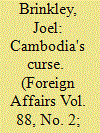|
|
|
Sort Order |
|
|
|
Items / Page
|
|
|
|
|
|
|
| Srl | Item |
| 1 |
ID:
086029


|
|
|
|
|
| Publication |
2009.
|
| Summary/Abstract |
Theary Seng often thinks of that April morning in 1975 when she watched her parents cheering on the Khmer Rouge as its soldiers marched into Phnom Penh. She was four years old. Within days, Pol Pot's foot soldiers had killed her father; three years after that, her mother died in a prison compound. Today, Theary Seng runs a nonprofit legal-advocacy group in Phnom Penh. She is eager to move on. But the rest of Cambodia, and much of the world, remains mired in the nation's sorrowful past. During its four-year reign, the Khmer Rouge killed as many as two million people. Nowadays, the venal government of Prime Minister Hun Sen may take "ten lives or even a hundred lives," she told me in August, "but what's that compared to two million? That's still the Cambodian standard, and that's the international standard." The devastation Pol Pot wreaked on his country remains hard to comprehend, even three decades later. His goal, as he put it, was to return Cambodia to "year zero" and transform it into an agrarian utopia. To that end, he purged his nation of educated city dwellers, monks, and minorities, while imposing a draconian resettlement program that uprooted almost everyone else. These measures led to the deaths of one-quarter of the country's population. The Khmer Rouge fell in 1979, when Vietnam invaded Cambodia and replaced the regime with a puppet government, in which Hun Sen became the foreign minister. When Vietnamese forces pulled out ten years later, they left behind several Cambodian factions battling for control. Then, in 1991, these groups' leaders signed a UN-sponsored peace accord, giving Cambodia the extraordinary opportunity to start over. Before Iraq, Afghanistan, Somalia, and even the Balkans, Cambodia was the international community's grand nation-building project. The country's new constitution awarded Cambodians the human rights, personal freedoms, and other protections of a modern democratic state. And in 1993, the United Nations staged a national election to select a democratic government. After the horrors of the Khmer Rouge, Cambodia would remake itself at last, and its people would have a chance to thrive.
|
|
|
|
|
|
|
|
|
|
|
|
|
|
|
|
|
|
|
|
|